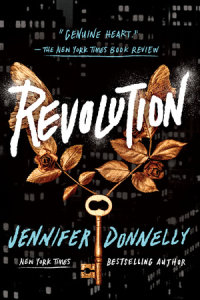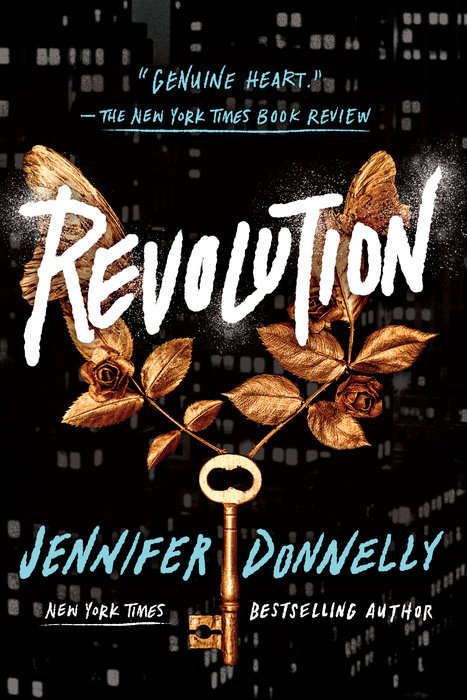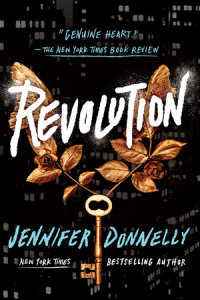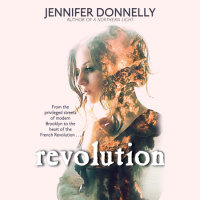Revolution
Readers of If I Stay and Elizabeth George will love Revolution by Jennifer Donnelly, New York Times bestselling author of Stepsister, Poisoned, These Shallow Graves, and the award-winning novel A Northern Light.
Andi Alpers is on the edge. She’s angry at her father for leaving, angry at her mother for not being able to cope, and heartbroken by the loss of her younger brother, Truman. Rage and grief are destroying her. And her father has determined that accompanying him to Paris for winter break is the solution for everything.
But Paris is a city of ghosts for Andi. And when she finds a centuries-old diary, the ghosts begin to walk off the page. Alexandrine, the owner of the journal, lived during the French Revolution. She’s angry too. It’s the same fire that consumes Andi, and Andi finds comfort in it—until, on a midnight journey through the catacombs, words transcend paper and time, and the past becomes terrifyingly present.
Revolution artfully weaves two girls’ stories into one unforgettable account of life, loss, and enduring love. Revolution spans centuries and vividly depicts the eternal struggles of the human heart.
Praise for Revolution:
An ABA Indies Choice Young Adult Book of the Year
An ALA-YALSA Top Ten Best Book for Young Adults
A Kirkus Reviews Best Book
A #1 Indiebound Selection
A School Library Journal Best Book of the Year
A Bulletin Blue Ribbon Book
A Chicago Public Library Best of the Best Book
An Amazon.com Best Book of the Year
★ “A sumptuous feast of a novel, rich in mood, character, and emotion.”—SLJ, Starred Review
★ “Every detail is meticulously inscribed into a multi-layered narrative that is as wise, honest, and moving as it is cunningly worked. Readers . . . will find this brilliantly crafted work utterly absorbing.”—The Bulletin, Starred Review
★ “Brilliantly realized, complete, and complex. The novel is rich with detail, and both the Brooklyn and Paris settings provide important grounding for the haunting and beautifully told story.”—Kirkus Reviews, Starred Review
An Excerpt fromRevolution
Those who can, do.
Those who can't, deejay.
Like Cooper van Epp. Standing in his room--the entire fifth floor of a Hicks Street brownstone--trying to beat-match John Lee Hooker with some piece of trip-hop horror. On twenty thousand dollars' worth of equipment he doesn't know how to use.
"This is the blues, man!" he crows. "It's Memphis mod." He pauses to pour himself his second scotch of the morning. "It's like then and now. Brooklyn and Beale Street all at once. It's like hanging at a house party with John Lee. Smoking Kents and drinking bourbon for breakfast. All that's missing, all we need--"
"--are hunger, disease, and a total lack of economic opportunity," I say.
Cooper pushes his porkpie back on his head and brays laughter. He's wearing a wifebeater and an old suit vest. He's seventeen, white as cream and twice as rich, trying to look like a bluesman from the Mississippi Delta. He doesn't. He looks like Norton from The Honeymooners.
"Poverty, Coop," I add. "That's what you need. That's where the blues come from. But that's going to be hard for you. I mean, son of a hedge fund god and all."
His idiot grin fades. "Man, Andi, why you always harshing me? Why you always so--"
Simone Canovas, a diplomat's daughter, cuts him off. "Oh, don't bother, Cooper. You know why."
"We all do. It's getting boring," says Arden Tode, a movie star's kid.
"And one last thing," I say, ignoring them, "talent. You need talent. Because John Lee Hooker had boatloads of it. Do you actually write any music, Coop? Do you play any? Or do you just stick other people's stuff together and call the resulting calamity your own?"
Cooper's eyes harden. His mouth twitches. "You're battery acid. You know that?"
"I do."
I am. No doubt about it. I like humiliating Cooper. I like causing him pain. It feels good. It feels better than his dad's whiskey, better than his mom's weed. Because for just a few seconds, someone else hurts, too. For just a few seconds, I'm not alone.
I pick up my guitar and play the first notes of Hooker's "Boom Boom." Badly, but it does the trick. Cooper swears at me and storms off.
Simone glares. "That was brutal, Andi. He's a fragile soul," she says; then she takes off after him. Arden takes off after her.
Simone doesn't give a rat's about Cooper or his soul. She's only worried he'll pull the plug on our Friday-morning breakfast party. She never faces school without a buzz. Nobody does. We need to have something, some kind of substance-fueled force field to fend off the heavy hand of expectation that threatens to crush us like beer cans the minute we set foot in the place.
I quit playing "Boom Boom" and ease into "Tupelo." No one pays any attention. Not Cooper's parents, who are in Cabo for the holidays. Not the maid, who's running around opening windows to let the smoke out. And not my classmates, who are busy trading iPods back and forth, listening to one song after another. No Billboard Hot 100 fare for us. We're better than that. Those tunes are for kids at P.S. Whatever-the-hell. We attend St. Anselm's, Brooklyn's most prestigious private school. We're special. Exceptional. We're supernovas, every single one of us. That's what our teachers say, and what our parents pay thirty thousand dollars a year to hear.
This year, senior year, it's all about the blues. And William Burroughs, Balkan soul, German countertenors, Japanese girl bands, and New Wave. It's calculated, the mix. Like everything else we do. The more obscure our tastes, the greater the proof of our genius.
As I sit here mangling "Tupelo," I catch broken-off bits of conversation going on around me.
"But really, you can't even approach Flock of Seagulls without getting caught up in the metafictive paradigm," somebody says.
And "Plastic Bertrand can, I think, best be understood as a postironic nihilist referentialist."
And "But, like, New Wave derived meaning from its own meaninglessness. Dude, the tautology was so intended."
And then, "Wasn't that a mighty time, wasn't that a mighty time . . ."
I look up. The kid singing lines from "Tupelo," a notorious horndog from Slater, another Heights school, is suddenly sitting on the far end of the sofa I'm sitting on. He smirks his way over until our knees are touching.
"You're good," he says.
"Thanks."
"You in a band?"
I keep playing, head down, so he takes a bolder tack.
"What's this?" he says, leaning over to tug on the red ribbon I wear around my neck. At the end of it is a silver key. "Key to your heart?"
I want to kill him for touching it. I want to say words that will slice him to bits, but I have none. They dry up in my throat. I can't speak, so I hold up my hand, the one covered in skull rings, and clench it into a fist.
He drops the key. "Hey, sorry."
"Don't do that," I tell him, tucking it back inside my shirt. "Ever."
"Okay, okay. Take it easy, psycho," he says, backing off.
I put the guitar into its case and head for an exit. Front door. Back door. Window. Anything. When I'm halfway across the living room, I feel a hand close on my arm.
"Come on. It's eight-fifteen."
It's Vijay Gupta. President of the Honor Society, the debate team, the Chess Club, and the Model United Nations. Volunteer at a soup kitchen, a literacy center, and the ASPCA. Davidson Fellow, Presidential Scholar candidate, winner of a Princeton University poetry prize, but, alas, not a cancer survivor.
Orla McBride is a cancer survivor, and she wrote about it for her college apps and got into Harvard early admission. Chemo and hair loss and throwing up pieces of your stomach beat the usual extracurriculars hands down. Vijay only got wait-listed, so he still has to go to class.
"I'm not going," I tell him.
"Why not?"
I shake my head.
"What is it?"
Vijay is my best friend. My only friend, at this stage. I have no idea why he's still around. I think he sees me as some kind of rehabilitation project, like the loser dogs he cares for at the shelter.
"Andi, come on," he says. "You've got to. You've got to get your outline in. Beezie'll throw you out if you don't. She threw two seniors out last year for not turning it in."
"I know. But I'm not."
Vijay gives me a worried look. "You take your meds today?" he asks.
"I did."
He sighs. "Catch you later."
"Yeah, V. Later."
I head out of the Castle van Epp, down to the Promenade. It's snowing. I take a seat high above the BQE, stare at Manhattan for a bit, and then I play. For hours. I play until my fingertips are raw. Until I rip a nail and bleed on the strings. Until my hands hurt so bad I forget my heart does.



